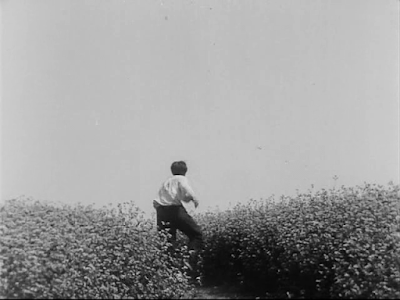Everything was mute and calm; everything gray. The sea, though undulated
into long roods of swells, seemed fixed, and was sleeked at the surface
like waved lead that has cooled and set in the smelter’s mould. The sky
seemed a gray surtout. Flights of troubled gray fowl, kith and kin with
flights of troubled gray vapors among which they were mixed, skimmed
low and fitfully over the waters, as swallows over meadows before
storms. Shadows present, foreshadowing deeper shadows to come.
(Benito Cereno, início)
Most melancholy of all the hours of earth, is that one long, gray
hour, which to the watcher by the lamp intervenes between the night and
day; when both lamp and watcher, over-tasked, grow sickly in the pallid
light; and the watcher, seeking for no gladness in the dawn, sees naught
but garish vapors there; and almost invokes a curse upon the public
day, that shall invade his lonely night of sufferance.
The one small window of his closet looked forth upon the meadow, and across
the river, and far away to the distant heights, storied with the great
deeds of the Glendinnings. Many a time had Pierre sought this window
before sunrise, to behold the blood-red, out-flinging dawn, that would
wrap those purple hills as with a banner. But now the morning dawned in
mist and rain, and came drizzlingly upon his heart. Yet as the day
advanced, and once more showed to him the accustomed features of his
room by that natural light, which, till this very moment, had never
lighted him but to his joy; now that the day, and not the night, was
witness to his woe; now first the dread reality came appallingly upon
him. A sense of horrible forlornness, feebleness, impotence, and
infinite, eternal desolation possessed him. It was not merely mental,
but corporeal also. He could not stand; and when he tried to sit, his
arms fell floorwards as tied to leaden weights. Dragging his ball and
chain, he fell upon his bed; for when the mind is cast down, only in
sympathetic proneness can the body rest; whence the bed is often Grief's
first refuge. Half stupefied, as with opium, he fell into the
profoundest sleep.
(Pierre, or the ambiguities, V, III)
In sight at gray dawn, the distant vessel, though in reality approaching, recedes from view, as the sun rises higher and higher. This holds true, till its vicinity makes it readily fall within the ordinary scope of vision. And thus, too, here and there, with other distant things: the more light you throw on them, the more you obscure. Some revelations show best in a twilight.
(Mardi, XIX)
It was in the cool of the early morning, at that hour when a man's
face can be known, that we set sail from Diranda; and in the ghostly
twilight, our thoughts reverted to the phantom that so suddenly had
cleared the plain.
face can be known, that we set sail from Diranda; and in the ghostly
twilight, our thoughts reverted to the phantom that so suddenly had
cleared the plain.
(Mardi, XXXVIII)


